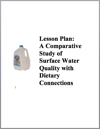Lesson Plan: A Comparative Study of Surface Water Quality with Dietary Connections (Grades 9-12)

Click here to see this entire lesson plan.
by Jeanne Yacoubou, MS
© The Vegetarian Resource Group
Purpose: To evaluate surface water quality of samples collected from a recreational use area and those from areas used for farming or animal-based agriculture. Samples will be compared over the period of one day, one week, or one year, as time and resources permit. Possible parameters to be examined:
- pH
- temperature
- turbidity
- nitrate concentration
- phosphate concentration
- fecal contamination
- antibiotic contamination
- dissolved oxygen (DO)
- biological oxygen demand (BOD)
Objectives: As a result of this investigation, students will be able to:
- identify multiple measures of water quality;
- collect environmental water samples and assess their composition and quality;
- display and interpret data in tabular and graphical forms;
- apply computational, analytical, and scientific reasoning skills to make comparisons and contrasts concerning water quality;
- propose ways to mitigate human-influenced negative effects on water quality.
Lesson Background:
Teachers may look at the United Nations’ 2006 report titled Livestock’s Long Shadow available at http://www.fao.org/docrep/010/a0701e/a0701e00.htm. Chapter IV deals with water pollution due to animal agriculture. Both national and global issues are discussed. The major conclusion of this Report is that livestock production is a leading source of environmental damage including climate change; water and air pollution; land degradation; and loss of biodiversity. The Report suggests that a human diet that is plant-based would prevent much of the environmental damage caused by animal agriculture, including the feedcrop production associated with it.
Click here to see this entire lesson plan.

As one person concerned about our Planet, I simply would like to share some important information (pertains to soy and the environment) with you that perhaps you, and no doubt other vegetarians, health foodies and non-dairy eating persons may not be aware regarding soy vs the environment.
And no this is not the typical comment you might expect, telling you soy bad for your health and bashing vegetarians (I have no problem with vegetarians). Even though, yes, despite your contradictions, there is significant evidence that soy, in certain amounts over an extended time period, is bad for your health and especially so for children.
But I digress, and I don’t want to put you off the main reason I’m writing this … please bare with me:
No, what I want to tell you is that today, in 2010, where the environment is of extreme concern, Brazil is the world’s largest exporter of soy globally. Why is this a problem? Deforestation (the destruction of the rain forests – the lungs of our planet) to make way for soy plantations to feed an ever increasing demand globally.
This fact should be of grave concern to every human being who cares, or professes to care, for the environment, themselves and their fellow man and nature. Especially when purchasing a product that contains some form of soy in its ingredients list (it is impossible nowadays to find products that don’t contain soy).
In an insidious fashion, the large food corporations have turned soy and its many so-called “healthy” by-products into the “high fructose corn syrup” of our day. I challenge you to walk through the aisles of any store, pick up random items and read through the ingredients – you will be shocked! Where soy was never on ingredients lists, even as recently as two years ago, it has now become common place!
All I’m saying is “be aware”.
You can read about deforestation in the Amazon (those forests are the lungs of our planet) by simply typing in the key-words “amazon deforestation soy”.
Thanks for listening!